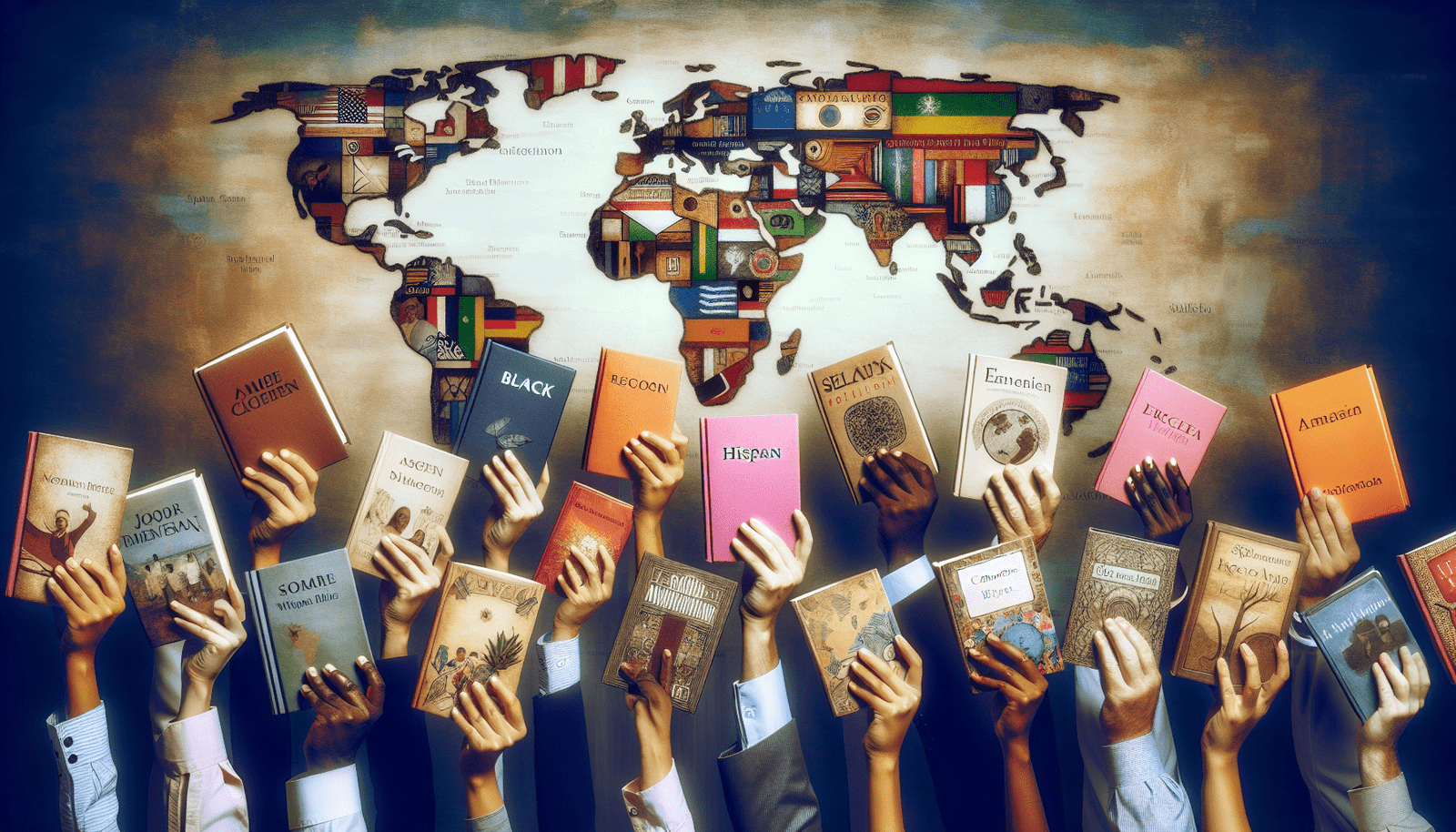In a world as richly diverse as ours, multilingual books have the incredible power to transcend borders and touch lives far and wide. Imagine holding in your hands a story that resonates with people from different cultures, all packaged within the same covers. In “What Are Some Successful Multilingual Book Titles That Captivated Global Audiences?” you’ll discover a delightful collection of literary masterpieces that have done just that. From enchanting fairy tales to gripping thrillers, these books have bridged linguistic divides and brought communities closer together, proving that the magic of a good story knows no boundaries.
Have you ever wondered how certain book titles manage to transcend cultural and linguistic barriers to captivate a global audience? It’s fascinating to think about, isn’t it? The world of multilingual book publishing is rich with stories that resonate far beyond their original linguistic and cultural contexts. In this article, we’ll dive into some of the most successful multilingual book titles that have enchanted readers around the world. Along the way, we’ll explore how these books have made such a significant impact globally.
The Power of Storytelling Across Cultures
Storytelling is a fundamental part of human history, and no matter where you come from, stories have the ability to connect people. The following book titles have not only been translated into multiple languages but have also won the hearts of readers across various cultures. Let’s take a closer look at these literary marvels.
Harry Potter Series by J.K. Rowling
It’s impossible to discuss successful multilingual books without mentioning the Harry Potter series. J.K. Rowling’s magical world has been translated into over 80 languages, making it one of the most translated literary works in history. The universal themes of friendship, bravery, and good vs. evil strike a chord with readers globally.
| Language | Original Title | Translated Title |
|---|---|---|
| English | Harry Potter and the Philosopher’s Stone | Harry Potter et la Pierre Philosophale (French) |
| Spanish | Harry Potter y la piedra filosofal | Harry Potter und der Stein der Weisen (German) |
| Japanese | ハリー・ポッターと賢者の石 | 哈利·波特与魔法石 (Chinese) |
The phenomenal success of this series can be attributed to its engaging plot, relatable characters, and the universal struggle between good and evil. It’s no wonder Harry Potter has become a cultural icon around the globe.
The Alchemist by Paulo Coelho
Next on our list is “The Alchemist,” a philosophical novel by Brazilian author Paulo Coelho. This book, originally written in Portuguese, has been translated into over 80 languages. Its simple but profound message about following one’s dreams has universal appeal.
| Language | Original Title | Translated Title |
|---|---|---|
| Portuguese | O Alquimista | El Alquimista (Spanish) |
| French | L’alchimiste | Der Alchemist (German) |
| Korean | 연금술사 | 煉金術士 (Chinese) |
Coelho’s narrative engages readers by touching on existential themes that are relevant no matter where you are from. The story spins a subtle web of spiritual insights that easily crosses cultural barriers, making it a beloved read worldwide.
The Little Prince by Antoine de Saint-Exupéry
“The Little Prince” is more than just a children’s book; it’s a philosophical tale that resonates with readers of all ages. Originally written in French, it has been translated into over 300 languages and dialects, making it one of the most translated books ever.
| Language | Original Title | Translated Title |
|---|---|---|
| French | Le Petit Prince | El Principito (Spanish) |
| Russian | Маленький принц | Der kleine Prinz (German) |
| Arabic | الأمير الصغير | 小王子 (Chinese) |
The book’s enduring themes of innocence, love, and loss have a timeless quality that appeals to readers worldwide. Its whimsical illustrations and thought-provoking narrative ensure that it remains a favorite across generations and cultures.
Why These Books Succeed Across Borders
You might wonder, what makes these books so successful on a global scale? While each book has its unique elements, certain common themes contribute to their worldwide acclaim.
Universal Themes
One of the most significant factors is the presence of universal themes. Whether it’s the triumph of good over evil in Harry Potter, the pursuit of dreams in “The Alchemist,” or the exploration of innocence in “The Little Prince,” these themes resonate globally. They speak to fundamental human experiences that are not confined by cultural boundaries.
Relatable Characters
Characters that readers can identify with play a crucial role in the universal appeal of these books. From the brave and loyal Harry Potter to the introspective shepherd Santiago in “The Alchemist,” and the curious and innocent Little Prince, these characters evoke empathy and connection, making the stories more engaging.
Engaging Plots
An engaging plot that keeps readers hooked is another critical factor. The magical world of Harry Potter, the spiritual journey in “The Alchemist,” and the philosophical adventures in “The Little Prince” are narratives that captivate readers’ imaginations, regardless of their cultural backgrounds.
Quality of Translation
The quality of translation also plays a vital role. An excellent translation retains the original’s essence while making it accessible to new audiences. Translators often work closely with authors to ensure that cultural nuances are preserved, making the translated work as impactful as the original.
Other Noteworthy Multilingual Titles
While we’ve highlighted three major successes, there are many other books that have successfully been translated into numerous languages and captured the imaginations of readers around the world.
One Hundred Years of Solitude by Gabriel García Márquez
Originally written in Spanish, this masterpiece of magical realism tells the multi-generational story of the Buendía family. Its themes of love, death, and fate resonate with an international audience, and it has been translated into numerous languages.
| Language | Original Title | Translated Title |
|---|---|---|
| Spanish | Cien años de soledad | Cent ans de solitude (French) |
| Italian | Cent’anni di solitudine | Hundert Jahre Einsamkeit (German) |
| Turkish | Yüzyıllık Yalnızlık | الوحده لا تعني النسيان (Arabic) |
The Girl with the Dragon Tattoo Series by Stieg Larsson
Stieg Larsson’s thriller series, starting with “The Girl with the Dragon Tattoo,” has achieved international popularity. Initially written in Swedish, the series has been translated into over 40 languages. The gripping plot and complex characters have found a global audience.
| Language | Original Title | Translated Title |
|---|---|---|
| Swedish | Män som hatar kvinnor | Les Hommes qui n’aimaient pas les femmes (French) |
| Dutch | Mannen die vrouwen haten | Οι άνδρες που μισούν τις γυναίκες (Greek) |
| Hebrew | הגברים ששונאים נשים | La chica del dragón tatuado (Spanish) |
The Hitchhiker’s Guide to the Galaxy by Douglas Adams
This humorous science fiction series originated in English and has been translated into more than 30 languages. Its quirky humor and imaginative plot make it a beloved read for many around the world.
| Language | Original Title | Translated Title |
|---|---|---|
| English | The Hitchhiker’s Guide to the Galaxy | Guia del Autoestopista Galáctico (Spanish) |
| Finnish | Linnunradan käsikirja liftareille | Guida galattica per autostoppisti (Italian) |
| Greek | Γυρίστε τον γαλαξία με ωτοστόπ | Na Calçada da Fama (Portuguese) |
The Challenges of Translation
Translating a book is no simple task. It’s more than just replacing words from one language with another; it’s about capturing the soul of the original work. Here are some challenges faced in the translation process.
Cultural Nuances
Cultural references and idiomatic expressions often do not have direct translations. Translators must find equivalent expressions or ways to convey the same meaning without losing the essence of the original text.
Maintaining Style and Tone
Every author has a unique style and tone, which needs to be preserved in the translation. This requires a deep understanding of both the original language and the target language to ensure that the author’s voice remains consistent.
Avoiding Literal Translation
Literal translations can lead to awkward phrasing and loss of meaning. Translators need to capture the essence and spirit of the text, which sometimes means rephrasing or reconstructing sentences entirely.
Cases of Successful Translations
Let’s look at some inspiring examples of how successful translations have brought stories to life in different languages.
“Pippi Longstocking” by Astrid Lindgren
Originally written in Swedish, “Pippi Longstocking” has delighted children all over the world. The charming story of the adventurous Pippi has been translated into 76 languages.
| Language | Original Title | Translated Title |
|---|---|---|
| Swedish | Pippi Långstrump | Pippi Calzaslargas (Spanish) |
| Russian | Пеппи Длинныйчулок | 長襪子皮皮 (Chinese) |
| Hindi | पिप्पी लंबे मोजे | Pippi Calzelunghe (Italian) |
“Anne of Green Gables” by L.M. Montgomery
This classic coming-of-age story has been translated into more than 36 languages. The universal themes of identity, belonging, and resilience resonate with readers across different cultures.
| Language | Original Title | Translated Title |
|---|---|---|
| English | Anne of Green Gables | Ana la de Tejas Verdes (Spanish) |
| Japanese | 赤毛のアン | Anne… la maison aux pignons verts (French) |
| Turkish | Yeşilin Kızı Anne | Anne uit Groen Gables (Dutch) |
“Don Quixote” by Miguel de Cervantes
Originally written in Spanish, “Don Quixote” is considered one of the greatest works of literature. It has been translated into more than 50 languages. The adventures of Don Quixote and his faithful squire, Sancho Panza, have been enjoyed by readers around the world.
| Language | Original Title | Translated Title |
|---|---|---|
| Spanish | Don Quijote de la Mancha | Don Quichotte (French) |
| German | Don Quijote | دون كشوت (Arabic) |
| Korean | 돈키호테 | 도생생윤 (Korean) |
What Makes A Book Title Successful Across Cultures
Understanding the elements that contribute to the success of a book title across cultures can provide valuable insights for aspiring authors and publishers. Here are some critical factors:
Simplicity and Clarity
A simple and clear title can easily be translated and understood in different languages. Complicated titles with cultural or idiomatic expressions might lose their meaning in translation.
Emotional Connection
Titles that evoke an emotional response are more likely to attract readers. Titles like “The Alchemist” and “The Little Prince” pique curiosity and create an immediate emotional connection.
Relevance to Content
A good title should give readers an idea of what the book is about. This relevance helps in retaining the essence of the original work during translation.
Linguistic Adaptability
Titles that can be easily adapted to different languages without losing their core meaning have a greater chance of international success. Flexibility in translation ensures that the title remains impactful.
The Future of Multilingual Publishing
The globalization of literature shows no signs of slowing down. With advancements in translation technology and increasing collaboration between authors and translators, we can expect even more books to captivate global audiences.
Technological Advancements
Technological developments in artificial intelligence and machine learning are transforming translation processes. While human translators are still irreplaceable, technology can assist in enhancing the accuracy and speed of translations.
Cross-Cultural Collaborations
Collaborations between authors, translators, and cultural experts can ensure that the translation process respects and reflects cultural nuances. These collaborations can help in creating translations that resonate with diverse audiences.
Increased Access
With the rise of digital platforms, books are more accessible than ever. E-books and audiobooks can reach readers in the most remote parts of the world, bridging linguistic divides and fostering a love for literature across cultures.
Conclusion
So, there you have it! From the magical world of Harry Potter to the philosophical journey of “The Alchemist” and the timeless charm of “The Little Prince,” these books have captivated global audiences through their universal themes, relatable characters, and engaging plots. The art of translation and the ability to convey the original message across different languages play a crucial role in their success.
As we move forward, the future of multilingual publishing looks promising, with technological advancements and cross-cultural collaborations paving the way for even more stories to enchant readers worldwide. Who knows? The next global literary sensation could be just around the corner, waiting to be discovered and translated into a multitude of languages. Happy reading!



